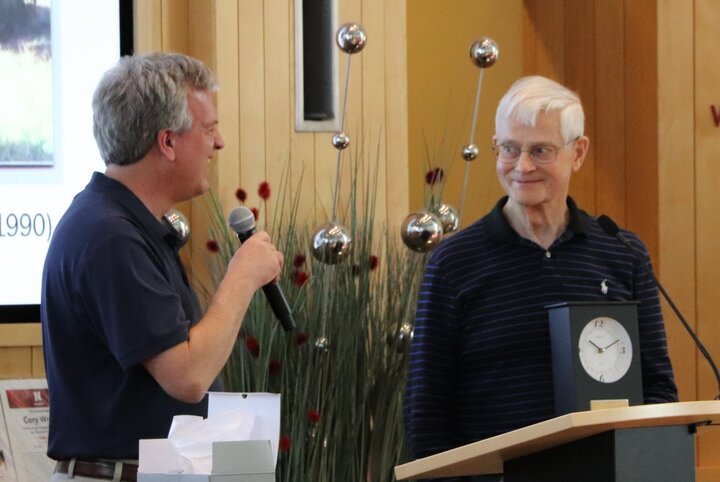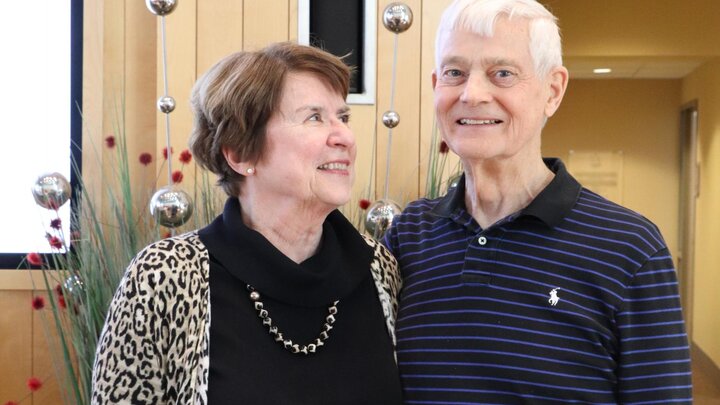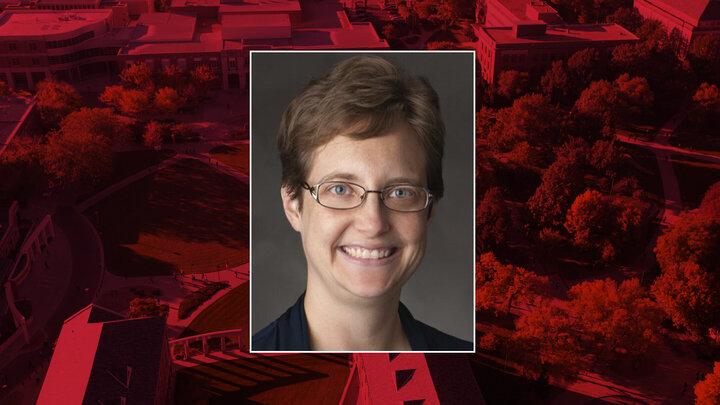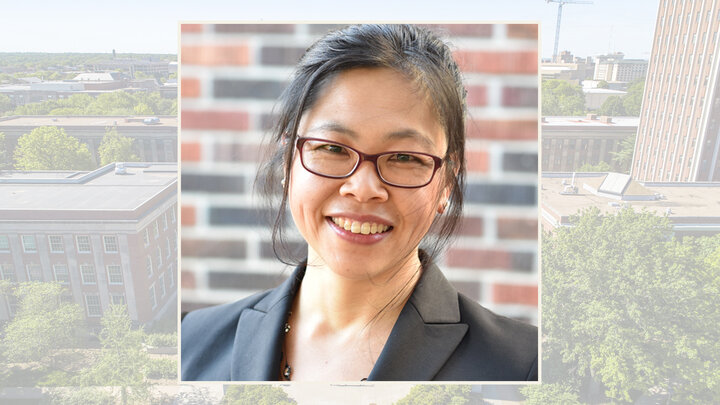Four faculty members earned 50-year Service Awards from the University of Nebraska-Lincoln in 2018.

One was the math department’s own Allan Peterson.
Peterson joined fellow Professors Edward Becker, Roger Bruning, and Brett Ratcliffe onstage at the Lied Center in September to receive the award from Chancellor Ronnie Green. He also was recognized at the Department of Mathematics’ April reception.
Peterson has taught 51 years without interruption —he has never taken a sabbatical since he arrived in 1968, because he loves teaching so much.
“In the history of the math department, I’ve taught more than anybody,” Peterson added.
However, he plans to retire at the end of 2018-2019 academic year, for health reasons. Peterson was diagnosed with prostate cancer three years ago.
Peterson said he is very proud of his record number of citations in the American Mathematical Society’s MathSciNet database.
“Overall, I’ve been cited 4,115 times by 1,538 different authors,” Peterson said. “And of all the math books and math research publications, in the year 2001, my book on time scales, ‘Dynamic Equations on Time Scales,’ is the second-most cited.”
Peterson, who has written eight books and more than 200 papers, was an assistant professor at Nebraska from 1968 to 1972, when he was promoted to associate professor with tenure. He became a full professor in 1976 and was awarded the Charles Bessey Professorship in 2006. In 1983, he also received a Distinguished Teaching Award. Over the years, Peterson has earned nine Recognition Awards for Contributions to Students at UNL; has served on the editorial board for 17 journals; and has had two conferences held in his honor: one at UNL in 2013 and another in Novacella, Italy, in August 2007.
Thirty-two doctoral students graduated with Peterson as their advisor, and he has two current students: Wei Hu and Ariel Setniker. From 2001 to 2014, Peterson mentored 51 REU students (Research Experiences for Undergraduates) and one McNair Scholar, Raegan Higgins, who is now an associate professor in the Department of Mathematics and Statistics at Texas Tech University.
In 1997, 2002, and 2009, Peterson was one of two main speakers at the University of Wyoming Rocky Mountain Mathematics Consortium Summer Conference, where he gave 10 75-minute lectures. He is one of only two mathematicians who have co-coordinated this conference three times.
Besides the starting salaries (his was $10,500 in 1968), Peterson said the main differences between the Department 50 years ago and now are the number of people doing research and the emphasis placed on teaching evaluations. What hasn’t changed since he arrived is his Differential Equations Seminar on Tuesdays and Thursdays — and not teaching over the lunch hour.
“I always ask not to teach between 11:30 and 1 because I go to the YMCA and workout. For years it was racquetball and now it’s power pump and cycling. I still go five days a week,” Peterson said.
Peterson chose to come to Nebraska due to Professor Lloyd Jackson, one of the nation’s leading scholars in ordinary differential equations. Peterson heard Jackson give several lectures at a conference in 1967 and thought he was “an excellent teacher.”
Peterson met several of Jackson’s students at that conference, including Professor Emeritus Lynn Erbe.
“I have known Al since we were both in Boulder, Colorado, in the summer of 1967, attending some special lectures given by John Barrett, his Ph.D. supervisor from the University of Tennessee, and my supervisor, Lloyd Jackson, from Nebraska,” Erbe said. “Al is well known through his extensive research in ordinary differential equations and his books on ODEs, difference equations, and fractional difference equations. When Al arrived in Lincoln, he was very involved in continuing the study of ODEs and teaching graduate courses using ideas and methods pioneered by Lloyd Jackson.”
For years, Peterson taught one graduate course, usually in ODEs, and one calculus course. For at least a decade, he taught a course called Honors Calculus, in which he covered all three sections of Calculus in two semesters.
He is also well known on campus because of the jokes he tells in his lectures, Erbe added.
“I used to tell jokes at the beginning, but now I tell a joke at the end of every class,” Peterson said. “I was teaching Math 104 one semester, and I was telling the joke at the beginning of the period. But what happened was, I would tell the joke and then about six people would get up and leave. So I said, ‘I’m not telling the joke at the beginning of the period anymore.’”
Michelle Homp, now an assistant professor of practice in the Department, shared one of Peterson’s jokes: “My favorite is one where I initially didn’t realize he was telling a joke. It was near the end of a class period, and Al started talking about applications of mathematics to real-world phenomena. One such connection was how bifurcations were believed to be related to the patterns observed in leopard spots. For his final example, he asked with a straight face, ‘And have you noticed when you see birds migrating in a V-shape that one side is always longer than the other? Do you know why that is?’ We paused in expectation of a complicated mathematical explanation. And then Al said, ‘Because there are more birds on one side.’”
Peterson has fond memories of his students, especially his Ph.D. students. “A lot of my Ph.D. students call me Dad,” Peterson said, smiling.
Johnny Henderson, Distinguished Professor of Mathematics at Baylor University, who was advised by Lloyd Jackson, relayed this story: “After I had accepted an offer to join the faculty at the University of Missouri at Rolla for the 1981-1982 academic year, I had to wait for UNL’s July 1981 commencement for my Ph.D. to be awarded. A few weeks after commencement, I was in Al’s office, of course reading the sports section of his newspaper, and Al just nonchalantly asked me how I thought I would do at UMR. I nonchalantly replied, ‘I think I’ll be OK.’ He continued the conversation by saying, ‘I mean, how do you think you will do with the research?’ And I replied, ‘I think I can write a paper or two every year,’ as that was what I had perceived as sufficient. Al said, ‘What if that won’t be enough?’”
Peterson said Henderson has far exceeded that goal.
Born March 9, 1942, in Buffalo, New York, and raised in Sioux Falls, South Dakota, Peterson received his bachelor’s and master’s degrees from the South Dakota School of Mines and Technology and his Ph.D. in 1968 from the University of Tennessee, Knoxville.
“My dad was a candy salesman, and he was a very hard worker,” Peterson said. “I feel like that really rubbed off on me. And my mother was either the smartest or second-smartest in her class. She always talked about wanting to go to college.”
Peterson had four siblings, one of whom is a medical doctor and another a chemical engineer. His original plan in college was to teach high school mathematics, but during his freshman year he heard another student talking about graduate school.
“My dad liked everybody to have a job, so I said to my dad, ‘I got my degree and now I’m going to go get a master’s degree.’ He exclaimed, ‘What?’ Then I got my master’s degree, and he asked, ‘Where are you going to go to work now?’ and I said, ‘I’m going to go for a Ph.D.’ ‘Oh, no!’ he said. My mother was just the opposite. She was really glad that I kept on going.”
Peterson, an avid Husker athletics fan (he has season tickets to Nebraska football, women’s basketball, and softball) and stamp collector (he has over 1 million), Peterson met his wife, Tina, of 56 years, at the South Dakota School of Mines, where they both worked in the cafeteria. They are very proud of the accomplishments of their three children and eight grandchildren. Daughter Carla majored in math and actuarial science. Son David has a master’s degree in electrical engineering. Carrie, the youngest daughter, carries on the family tradition of teaching. In 2019, the oldest grandson, Billy, will graduate from Stanford with a math major and will pursue a Ph.D. in economics. Also in 2019, the oldest granddaughter, Ashley, will skip her senior year of college to start pharmacy school. Granddaughters Kelsey and Anna are in college preparing for medical careers, and grandsons Josh, Danny, Alexis, and Aidan are in high school.
“I hope I’m remembered for trying to show my love of mathematics,” said Peterson, who feels very blessed to be a professor at Nebraska and to have such wonderful colleagues in the Department. “I also really like that I got to have so many Ph.D. students. That’s the most anybody’s had in the Department.”
(image above)- Allan Peterson accepts a gift from the Department and Chair Tom Marley (left) at the April 2018 recognition reception.




